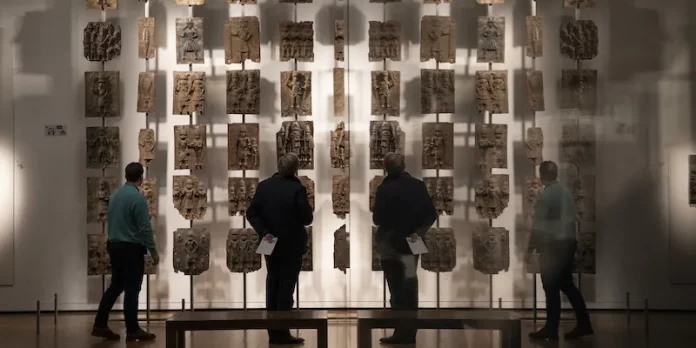The Horniman Museum in London has announced that it will return 72 precious artifacts to Nigeria that were looted by the British Army in 1897 in present-day Benin City, Nigeria. At the beginning of the year, the Nigerian government called for the return of many objects of immense cultural value stolen from the country over the years: it is estimated that there are about 10,000 in total, preserved in 165 museums and private collections around the world.
The Horniman Museum is the first institution funded by the British government to do so, and its decision may have a significant symbolic value: most of the objects stolen from Nigeria, about 900, are actually in the British Museum in London, one of the The most important history museums in the world and which, like Horniman, are financed by the government. However, the British Museum has always refused to return the collection, receiving much criticism from various historians and activists.
The debate over the legitimate ownership of the antiquities and monuments displayed in many Western museums is a debate that has existed for a long time but has recently intensified due to new sensibility regarding the responsibilities of Westerners who colonized the South for centuries. America, Asia and especially Africa. The placement of works of art in today’s museums often has a history of winding and opaque passages, with complicated discussions about where to display them. But it is an established fact that many works did not originally belong to the political entity in which the museums house them today are located, and the circumstances under which they were stolen often legitimized the requests of the ancient owners.
Nigeria is trying to recover thousands of objects it claims to have opened exhibitions in cities such as Lagos or Benin City, where a museum of West African art is set to open in 2025. In recent months, other institutions in various countries have already decided to return the valuables to Nigeria: Germany has returned more than 1,100 artifacts; The University of Aberdeen, Scotland returned a plaque with the head of a Oba (a king and religious leader); Oxford and Cambridge universities announced The return of over 200 items last week.
Some “Benin Bronze” returned from Germany (Thomas Niedermueller/Getty Images)
A large number of exhibits displayed at the British Museum”bronze from benin“(which has nothing to do with the current state of Benin), especially the bronze and brass sculptures which are considered to be of great historical and cultural value: these are very elaborately decorated cast plates, depicting human heads, animals, etc. They are a priceless testimony to the society that lived in the Kingdom of Benin, a medieval African city-state that had the present-day city of Benin as its capital. The bronzes were mostly used to honor ancestors and often used to decorate the walls of the royal palace.
In 1897 the British Empire conquered the Kingdom of Benin – which had expanded greatly after the Middle Ages and became essentially a small empire – and captured many valuables.
– Also read: Whose Antiques Are in Museums?
The 72 objects also include twelve bronzes that the Horniman Museum will return. The president of the museum, Eva Salomon, said that “it is very clear that these objects were obtained by force” and that several consultations with experts from outside the museum also agreed that it was “ethical and necessary to return them to Nigeria”. appropriate for”.
Dan Hicks, professor of archeology at Oxford, compiled a list of 165 institutions in the world where Benin bronzes are preserved, They said that the Horniman Museum’s decision could prompt the British Museum to change its mind. So far the latter has always justified itself by taking advantage of two British laws that largely range The museum has great potential to hand over its heritage, and it is proposed to engage with research and cultural exchange initiatives in Nigeria as much as possible.
The possibility of establishing forms of cooperation between states – rather than returning works – is supported by various experts who believe that changing the location of the property is not historically profitable, which in a new context now has another meaning. has received.
The most famous case around which this debate has concern concerns another work preserved in the British Museum in London: the sculptural groups and friezes that once stood on the Parthenon, the main temple of the Acropolis of Athens. They were deported in the early nineteenth century and brought to England by Count Elgin, ambassador to the Ottoman Empire (of which Greece was part). In which museum they should be kept, the question is still open and has given rise to various claims by the Greek government, which has only received disclaimers.
Once in the UK, the Parthenon marbles acquired great importance in European art history, and some argue that bringing them back to Greece today would represent new damage to the culture and undermine the new meaning created around the work.
Several cases of restoration have been reported in recent years, largely thanks to the action of UNESCO, which since 1978 created an intergovernmental commission to encourage the restoration of illegally acquired cultural property. The purpose of the commission is to promote bilateral relations between the countries involved, helping them find a settlement for a possible refund.
However, these usually occur only in contexts in which the illegal origin was well established, and in recent times have mostly been stolen items and recovered by authorities. For works with a long history, and whose ownership is much debated, voluntary acts such as the Horniman Museum are required.

Devoted problem solver. Tv advocate. Avid zombie aficionado. Proud twitter nerd. Subtly charming alcohol geek.







